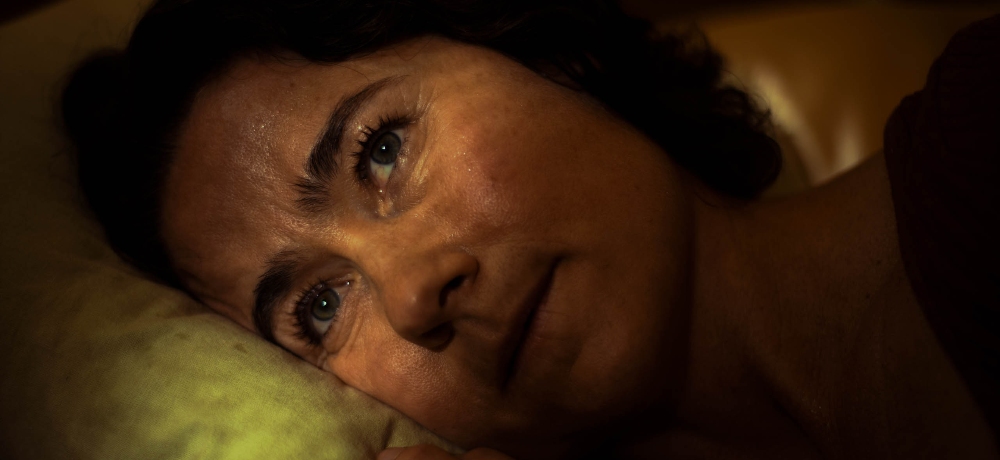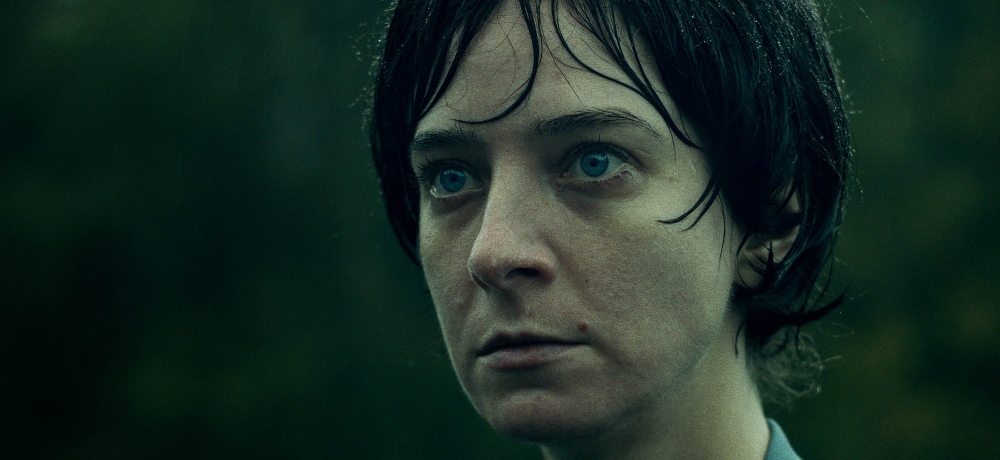


With the 2021 Sundance Film Festival now officially in the books, here’s a look at three different female-centric films that I had the opportunity to screen during the festival: Frida Kempff’s Knocking, Violation from Madeleine Sims-Frewer and Dusty Macinelli, and Karen Cinorre’s girl power fantasy Mayday.

Knocking: In Knocking, filmmaker Frida Kempff has crafted a timely and effective thriller that explores mental health in a very thoughtful and thought-provoking way. The story is centered around Molly (Cecilia Milocco), a woman who has recently been released from a psychiatric facility after experiencing a traumatic event and is looking to start her life over. As she settles into her new apartment during an oppressive heatwave, Molly begins to hear a mysterious knocking through the wall. What could it be? Is it someone fixing something, or is there something more sinister than that going on? As Molly begins to investigate the strange noises, she comes to realize that no one else around her hears what she’s hearing, and Molly struggles as she feels her sanity slowly slipping away with every percussive bang on her wall.
As a viewer, Knocking makes for a maddening (in a good way) experience, with Kempff doing a fantastic job of keeping us squarely in the middle of Molly’s frustrations, as we watch her struggle with being believed and heard by the world around her. But because of Molly’s mental health issues in the past, no one seems to want to give her the benefit of the doubt, and that’s when Knocking becomes something more than just a psychological horror movie: it’s Kempff’s emphatic cinematic statement about how society treats those who have mental health issues, and how it easily dismisses them, without ever giving them the benefit of the doubt regardless of how right they are.
Another way that Kempff and her team puts us right into Molly’s proverbial shoes is through some innovative and dizzying camera work that acts as the lens into the mind of Knocking’s protagonist. Beyond that, cinematographer Hannes Krantz also perfectly captures the mood of Knocking through his lens that reflects that status of Molly’s life visually. In the film’s flashbacks, the palette is warm and sun-soaked, demonstrating how idyllic life was for our protagonist before her breakdown. And once we catch up with Molly in present times, the colors surrounding her are often shades of a sickly green or these bland, neutral tones, representing just how “off” things feel for Molly at this stage in her life.
For Knocking, Milocco is front and center about 95 percent of the time, with the camera affixed squarely on her visage as she tries to navigate her way through her new life to the best of her abilities. The actress delivers an incredible performance in the film, effortlessly moving between her internalized grief and sadness and her doggedly determined frustrations with a world that refuses to believe that there’s something very wrong happening in her apartment building. Make no mistake, Knocking is Milocco’s vehicle and she very much rises to the occasion here.
That being said, the film’s finale feels a bit rushed in comparison to everything that precedes it, and I do wish that Kempff had taken more time with fleshing out Knocking’s third act. How the story resolves itself worked for me, but I just wish that we would have had a little bit more in those moments that felt more in line with the film’s first 60 minutes. As a whole, though, there’s still a lot about Knocking that I really appreciated, including the film’s stunning sound design, and I think that Kempff has created an impressive showcase for herself here with her feature film debut.
Movie Score: 3.5/5

Violation: I don’t think anything could have really prepared me for Violation from filmmakers Madeleine Sims-Frewer and Dusty Mancinelli, as it is easily one of the most uncomfortable viewing experiences I’ve had in the last few years. An unflinchingly vicious, and even grotesque at times, examination of the effects of sexual assault, and the dark places it can drive those who have been victimized, Violation does an excellent job of confronting the issue driving its narrative, but it’s piecemeal approach to the story diminishes some of the film’s powerful messaging, which ultimately left me feeling like something was missing by the time the credits began to roll.
At the center of Violation is Miriam (played by Sims-Frewer), a woman whose relationship with her partner Caleb (Obi Abili) is on its last legs, with the two barely able to connect both emotionally and physically at this point. They head out for some R&R at the cabin of Miriam’s sister Greta (Anna Maguire) and her husband Dylan (Jesse LaVercombe), and things start off innocently enough. But after a late night of drinking around a campfire, a line is crossed (I’m being vague here on purpose), and this hollow and horrible act leaves these two couples dealing with the ramifications of what has transpired, and the results are horrifying, ugly, and so brutally violent that during a sequence involving a body being dismembered, I actually had to briefly look away.
That’s a testament to the power of Violation’s story and the film’s visual style, as well as Sims-Frewer’s performance that feels like the human embodiment of boiling water in a pot that’s furiously bubbling over the brim. She’s absolutely fantastic, and the rage and confusion that she utilizes to propel Miriam throughout Violation is palpable. Visually, the film utilizes a few key shots (including a breathtaking kaleidoscopic view of the landscape on their vacation) to reflect Miriam’s state of mind, and when the film takes a turn and goes into full-blown horror terrain, the intimacy of how the camera captures those sequences is shockingly gruesome, and even a little bit sad as Miriam confronts what she has done.
Despite all the good that Violation accomplishes, what holds the film back from being great is the use of a non-linear approach to the storytelling. Considering we know the events at the center of Violation, chopping them up the way they are presented here doesn’t really add much to the narrative, as it almost feels like the filmmakers were looking for viewers to piece together a mystery that’s not really there to begin with. I’m sure some of the structure was meant to reflect Miriam’s fractured state of mind, but again, telling Violation’s story in this manner ends up muddling the film’s message rather than heightening it. That being said, there’s still a lot about Violation that makes it well worth a watch, but I do wish that the film had been structured differently so that the gut-punch of the finale would have landed a lot harder than it does now.
Movie Score: 3/5

Mayday: Oh, Mayday. Based on your premise alone, I was really excited to see what Karen Cinorre was going to bring to the table for her feature film debut, but ultimately was left feeling disappointed by the results. The war/fantasy mash-up clearly owes a lot to timeless stories like Alice in Wonderland and The Wizard of Oz, as well as the film Sucker Punch, but the frustrating part about Mayday is that it never really comes together from a narrative standpoint, and the results are a somewhat shallow imitation of a story about female empowerment that doesn’t really have a whole lot to say.
In Mayday, a put-upon waitress named Ana (Grace Van Patten) is transported to an alternate universe where she lands on an island being controlled by a group of women, led by the strong-willed Marsha (a very game Mia Goth, who is easily the best part of the film). The women are engaged in a battle of the sexes and they do their best to lure men to the island as a means of not only entrapping them, but killing them off as well. And truth be told, that’s pretty much the basic gist of what Mayday has to offer.
Clearly, Cinorre was looking to make a statement about gender politics with Mayday, but I think my biggest issue is that it really doesn’t say anything at all. The dialogue is a bit ham-fisted at times, and there’s not much else to the story to support its themes, either, which makes the whole journey of Mayday ring hollow in the end.
On a visual level, Mayday is downright stunning, and much of that is due to the efforts of cinematographer Sam Levy, who gives the film a fantastical feeling that enhances the out-of-this-era aspects of Cinorre’s story. Mayday’s score is a highlight as well, and I hope Colin Stetson’s music gets a release because it’s absolutely gorgeous and does add a lot. Unfortunately, there’s not much else to Mayday beyond a few key performances and great visuals and music, and that is a damned shame.
Clearly, Cinorre was looking to say something about the treatment of women in society, particularly by those of the opposite sex, but she never gets around to saying anything truly meaningful in Mayday, instead opting to play the mystery of Ana’s journey close to the vest instead of letting the audience in on just what is happening during her time on the island. Beyond that, Mayday also wastes the talents of Juliette Lewis here (which is a nearly unforgivable cinematic crime in my book), and never tries to do anything more than just create an “us versus them” story that has very little meaning to it. I appreciate the ambition that is on display here from Cinorre and company, but Mayday just never hits its stride as an allegory for the female experience, and I hope that in the future she’ll dig a bit deeper as a visual storyteller than she does here.
Movie Score: 2.5/5
----------
Visit our online hub to catch up on all of our Sundance interviews and reviews!
[Photo Credits: Above photos courtesy of the Sundance Institute and Ida Zimmerman (Knocking), Hannes Krantz (Knocking), One Plus One (Violation), and Tjaša Kalkan (Mayday).]